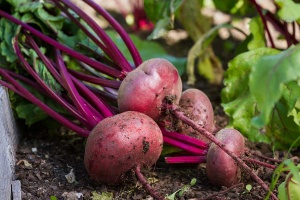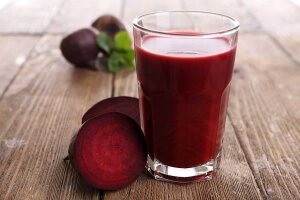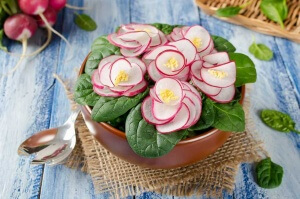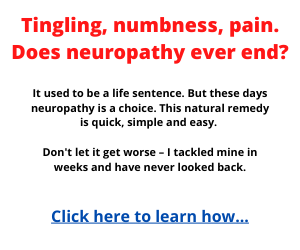In this post, you will find detailed information on how beets and other nitrate-rich foods can help you naturally lower high blood pressure. This is the first article in a series on foods that lower blood pressure.
According to the latest statistics from the Centers for Disease Control and Prevention (CDC), about one in every three American adults has higher than normal blood pressure.
This translates to about seventy million Americans having high blood pressure, also known as hypertension. High blood pressure often leads to heart attacks, congestive heart failure, stroke, and kidney disease.
In fact, high blood pressure contributed to the death of more than 360,000 Americans in 2013.
The good news is that many people can control their blood pressure through diet and exercise, thereby eliminating the need to take blood pressure medicine that so often leads to unwanted side effects.
These side effects include dehydration, gout, erectile dysfunction, weakness, fatigue, fainting, chest pain, shortness of breath, difficulty breathing, and critical potassium loss (hypokalemia) leading to muscular function.
Some blood pressure medications, including diuretics and beta-blockers, can lead to elevated blood sugar which is especially problematic for diabetics.
Additionally, angiotensin II receptor blockers and ACE inhibitors can cause serious problems for pregnant women and can lead to developmental issues for the baby.
Beets lower blood pressure
Beets contain exceptionally high levels of inorganic nitrate. This is the key to why beets are so good at lowering blood pressure.
When you eat beets, the inorganic nitrates they contain are converted to nitric oxide and this enters your bloodstream.
Nitric oxide in the bloodstream has a three-pronged effect in lowering blood pressure.
First, the nitric oxide relaxes the smooth muscles lining your blood vessels.
Second, nitric oxide has an antiplatelet effect, i.e. an anticoagulant effect. This prevents your blood from thickening and clotting.
Third, beets are a good source of potassium which lessens the effect of sodium. Potassium is also a good vasodilator and has the effect relaxing the small blood vessels in your muscles and brain.
All of these effects reduce the amount of energy your heart needs to pump blood throughout your body, thus lowering blood pressure.
Research proving the effectiveness of beets
1. Queen Mary University of London study
One of the best research studies showing that raw beet juice is effective at lowering blood pressure was conducted by researchers at the London School of Medicine and Dentistry, Queen Mary University of London. The results were published in February 2015 in the peer-reviewed journal, “Hypertension.”
Each of sixty-eight participants was given 250 milliliters of beet juice each day for two weeks. For American readers, this is about 8 1/2 ounces of beet juice (just over one cup).
Half of the participants were given regular beet juice that contained nitrate. The other half were given nitrate-free beet juice as a control.
The results of this study were quite convincing!
The blood pressure in those individuals who drank the normal beet juice with nitrate was lower by an average of around eight points in just two weeks.
Participants ranged from 18 to 85 years old and every participant had high blood pressure.
2. University of Reading study
This study was published in the peer-reviewed journal, “British Journal of Nutrition,” in December 2012.
In this study, three types of beetroot-enriched bread were given to men with high blood pressure, plus a control where water was substituted for beet juice.
The men were split into four groups eating a total of 0, 100, 250 and 500 grams of beetroot-enriched bread.
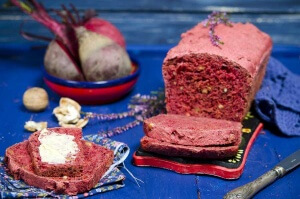
There was a significant lowering of blood pressure in those men who ate this novel beetroot-enriched bread product compared to the control.
The blood pressure was lowered more as the amount of beet juice in the bread increased. There were no significant differences between bread varieties.
This study is especially intriguing for one very important reason: the beetroot was not raw but rather cooked into the bread. Keep in mind too that bread is baked at high temperatures for a long time.
This shows that COOKED beets can be very effective at lowering blood pressure, contrary to what some sources that insist the beets be raw would have you believe.
In other words, you can lower your blood pressure with both raw and cooked beets. The taste of each is quite different.
How to incorporate beets into your diet?
Fresh beet juice
You can add variety to your beet juice by mixing it with celery juice (also lowers blood pressure), apple juice, or carrot juice.
Add a bit of fresh ginger for a little kick and to improve your circulation.
Delicious salads
Thick grated raw beets taste great mixed in green lettuce and raw vegetable salads. Add radishes to lower your blood pressure too.
You can also make a shredded beet salad by adding extra virgin olive oil plus rice vinegar and or lemon or lime (in the typical three parts oil to one part acid ratio). You can add a pinch of salt and or sugar to taste.
Shredded carrots compliment this salad well and add a nice color contrast that will impress your family and friends and make your beet salad a feast for your own eyes. Fresh basil or other herbs can make this delicious salad even more special.
Scrumptious roasted beets
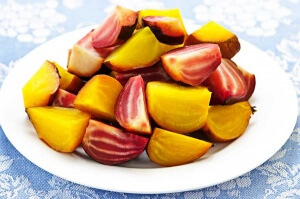
Simply wash them and pop them into the oven to roast for 40-60 minutes (test them for softness like you would a potato).
Cool, peel, and drizzle a little virgin coconut oil on them. The first time you try roasted beets, you'll be hooked!
Other foods high in nitrate
You don't have to eat beets or drink beet juice every day to benefit from a blood pressure lowering diet!
Other vegetables that have high nitrate levels include radishes, spinach, celery, lettuce, and all the Brassica greens such as kale, cabbage, mustard greens, and collards.
Final thoughts
Make a point of incorporating a variety of beets and other nitrate-rich foods into your diet on a regular basis and you should see your blood pressure go down.
It can be a really fun experiment (get the kids involved, they'll love it!) to keep a food diary and list your blood pressure every day in this journal.
This way, you can go back and determine what specific nitrate-rich foods, and in what quantity, help the most.
You may also want to record exercise in the same journal to see how exercise combines with diet to lower blood pressure.
Yellow and rainbow beets have just as many nitrates as the more common red beets so enjoy a wide variety of tastes, colors, and antioxidants!
LAST UPDATED FEBRUARY 1, 2019
